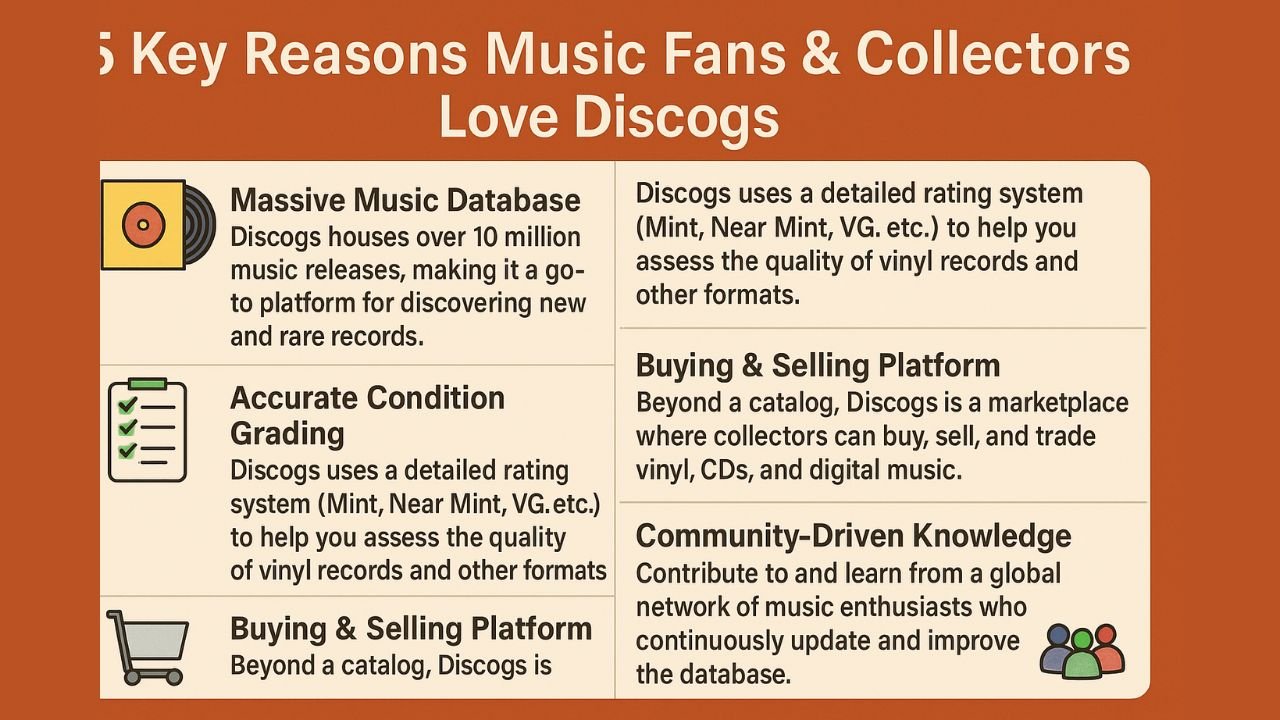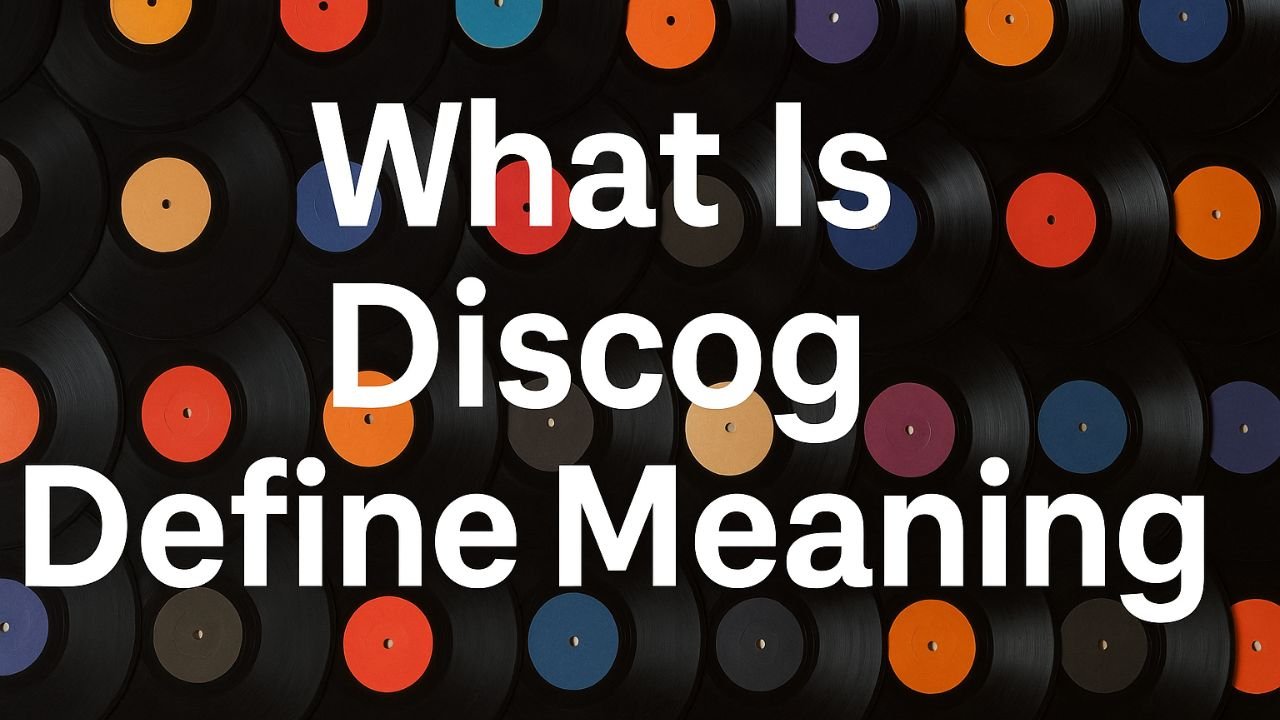In the world of music, the term “Discog Define” has grown in importance, particularly among avid collectors and music fans. If you’re wondering what Discog Define actually means, you’re not alone. Whether you’re a casual listener, an active collector, or someone starting to explore the treasure trove of vinyl, CDs, and digital music archives, understanding this term can help you navigate through one of the most widely used music databases on the internet: Discogs.
In this article, we’ll break down the meaning of Discog Define and why it’s an essential tool for music enthusiasts. We’ll dive into how it’s used, how to make the most of it, and why it matters to both collectors and fans alike. From exploring your favorite artists to tracking rare albums, this guide will give you all the tools you need to master the art of Discogs.
5 Key Reasons Music Fans & Collectors Love Discogs

- Massive Music Database
Discogs houses over 10 million music releases, making it a go-to platform for discovering new and rare records. - Accurate Condition Grading
Discogs uses a detailed rating system (Mint, Near Mint, VG, etc.) to help you assess the quality of vinyl records and other formats. - Market Data for Collectors
Track historical price trends and see how the value of your collection evolves over time. - Buying & Selling Platform
Beyond a catalog, Discogs is a marketplace where collectors can buy, sell, and trade vinyl, CDs, and digital music. - Community-Driven Knowledge
Contribute to and learn from a global network of music enthusiasts who continuously update and improve the database.
What Is Discog Define?
At its core, “Discog Define” refers to a query or explanation of terms related to Discogs, a massive online database of music recordings, particularly focused on vinyl, CDs, cassettes, and digital formats. The term “Discog Define” specifically aims to clarify how the platform organizes its vast music collection, the information it provides, and how users can interact with it.
Discogs (short for “Discographies”) is a community-driven platform, meaning it relies on contributions from music lovers around the world to build and maintain its catalog. It’s not just an online store; it’s a complete music archive where you can find detailed discographies, album artwork, tracklists, release dates, and even user ratings.
👉 Check out our post on Sweetie Fox Minecraft Skin: Customize Your Game in Style for more insights.
How Does Discogs Work?
When you search for any music release on Discogs, you’re tapping into a massive database that includes over 10 million releases. Each release is cataloged with meticulous details, including its format, artist information, tracklisting, record label, and even its value based on market trends.
The term “Discog Define” is often used to explore specific elements of these entries. For example, a fan might search for “Discog Define Vinyl Condition” to learn how Discogs rates vinyl records from “Mint” to “Poor.” Understanding the ratings and the terminology used within Discogs is vital for anyone looking to buy, sell, or catalog music.
Why Discogs Matters to Music Fans & Collectors
For music collectors, Discogs offers a wealth of benefits, whether you’re hunting for rare records, tracking down a lost album, or even determining the value of your current collection. Here’s why it’s an essential tool:
- Comprehensive Music Database
Discogs is the most extensive music database available, with over 10 million releases listed. If you’re a fan of any music genre, you’ll find it on Discogs.
- Buying & Selling Platform
Beyond just cataloging music, Discogs serves as an e-commerce site where users can buy and sell records. This creates a massive marketplace where rare records can go for impressive sums.
- Community-Powered Knowledge
Discogs thrives on its community of collectors and music fans who contribute to the accuracy and completeness of the database. This crowdsourced nature ensures that information remains up-to-date and accurate.
- Value Tracking for Collectors
For collectors, Discogs includes market data to track the value of albums. You can see historical price trends and compare values to better understand what your music collection is worth.
- Rare Finds
If you’re looking for limited-edition releases, foreign imports, or out-of-print albums, Discogs is the place to go. Many hard-to-find records are listed on the site, often by users who are parting with their collections.
The Key Terminology: What Does Discog Define in the Context of Music?
To fully appreciate Discogs, it’s important to familiarize yourself with some key terms and how they apply to music. Here are some important terms that Discog Define commonly includes in its descriptions:
Discogs Vinyl Condition Ratings
When browsing vinyl records, the term “condition” plays a huge role in determining the quality and value of the record. Discogs has a defined system for grading records that helps buyers and sellers assess the quality before making a transaction. Here’s a quick look at the system:
- Mint (M): Perfect condition, no visible defects, and plays without any issues.
- Near Mint (NM): Almost perfect, with only minor signs of handling.
- Very Good Plus (VG+): Signs of wear, but it plays well without significant distortion.
- Good (G): Noticeable wear that affects the sound quality but still playable.
- Poor (P): Major damage that severely affects the sound quality.
These terms are used across Discogs to categorize and define the condition of records, which is essential for any collector.
Discogs Release Versions
Another aspect of “Discog Define” refers to the different versions of a particular release. For instance, an album may have multiple versions based on:
- Release Date
- Country of Origin
- Format (Vinyl, CD, Cassette, Digital)
- Special Editions (Colored vinyl, Limited runs)
Each version is meticulously cataloged on Discogs, which allows collectors to see how versions differ and what makes them unique. For example, a first pressing of an album might be worth more than a later repressing, and this is where knowing how to define these variations becomes crucial.
How to Use Discogs Effectively: Tips for Music Fans & Collectors
Now that you understand what Discog Define means, let’s explore how you can leverage Discogs to enhance your music collection, whether you’re buying, selling, or just cataloging your library.
Create an Account and Start Exploring
The first step is to sign up for a free Discogs account. This will give you access to all the features, such as building your collection, adding releases, and even selling items.
Build Your Collection
You can begin by cataloging your own collection on Discogs. This gives you an overview of your music library and helps track the value of your items. When adding records, Discogs will often provide suggestions based on its extensive catalog, so you’re able to link directly to the relevant entries.
Set Alerts for Rare Finds
Discogs offers a “Wantlist” feature that allows you to add records you’re searching for. You can set alerts to be notified when they become available for sale. This is incredibly useful for collectors searching for rare, out-of-print records.
Research the Market
Before purchasing or selling, research the market prices. Discogs provides comprehensive statistics on the price history of specific albums, which is invaluable if you’re looking to make an informed purchase or sale.
🔗 Explore more Time Capsule USA
Condition Grading and Accuracy
When purchasing from sellers, always check the condition grading. If you’re a seller, be meticulous about describing the condition of your records to avoid any potential issues with buyers. Accuracy in grading is vital on Discogs.
Understanding Discogs in the Broader Music Community
Discogs is not just a tool for collectors; it’s also a crucial resource for music historians, enthusiasts, and even professional musicians. The database offers detailed information about release dates, tracklists, and artists, which is beneficial for anyone seeking to deepen their knowledge of music.
Furthermore, the platform fosters a sense of community among music lovers. The forums and user contributions mean that fans can discuss their favorite albums, share insights, and discover new music.
The Future of Discogs and Digital Collecting
As music formats evolve and digital music continues to gain prominence, platforms like Discogs are adjusting. Vinyl records are seeing a resurgence, and digital collecting is beginning to grow. Discogs is adapting by providing new features for digital music catalogs and ensuring its database remains relevant for future generations of collectors.
Conclusion: Why You Should Use Discogs Today
In conclusion, understanding “Discog Define” is the first step to unlocking the full potential of Discogs for music fans and collectors. Whether you’re looking to catalog your collection, find rare vinyl, or explore an artist’s discography, Discogs provides a wealth of resources to enhance your music experience.
For collectors, it’s an indispensable tool that can help you track your investments and find missing gems for your collection. For casual music fans, it’s a fantastic platform for discovering new music and exploring different formats.
FAQs about Discog Define
- What does Discog Define mean?
Discog Define refers to understanding the terms, labels, and categorization systems used within Discogs to organize and describe music releases. - How does Discogs help collectors?
Discogs provides detailed cataloging of music releases, including condition ratings, market value data, and a vast community of collectors for buying and selling. - What’s the best way to find rare albums on Discogs?
Use the Wantlist feature to set alerts for albums you’re looking for, and check the release versions for any special editions or limited runs. - Can I sell my records on Discogs?
Yes, you can sell your records on Discogs by listing them for sale in the marketplace. Ensure your condition grading is accurate to avoid issues. - How accurate is the pricing on Discogs?
Discogs uses data from recent sales to provide market insights and price trends. However, actual prices can vary based on condition and demand. - Can I use Discogs for digital music?
Yes, Discogs includes digital releases in its catalog, although it is more well-known for vinyl and physical formats.










